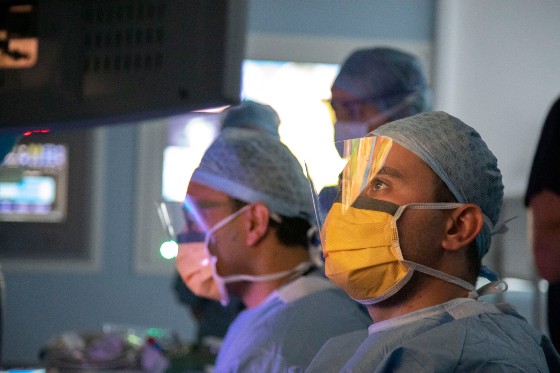
Ireland’s first Digital Surgery Unit was officially opened at the Mater Misericordiae University Hospital on Thursday 25th July 2019. Led by Professor Ronan Cahill, UCD Full Professor of Surgery at the Mater Hospital, this unit aims to break new medical ground through world-class research into future modes of human-machine collaboration in the surgical theatre.
By researching the integration of medicine with new technologies such as Artificial Intelligence (AI), and by including data analysts as part of surgical teams, this work aims to create new ways to support surgeons to make better decisions, thus promising better outcomes for patients.
More broadly, this research is intended to contribute to a deeper bank of knowledge which can then be used to improve the patient experience for the next person undergoing such surgery. This project builds on the field-leading surgical practice which is already established at the Mater, where enhanced digital visualisation assists in precision and safety in colorectal cancer surgery. Personalising operations in this way has already resulted in better care for patients.

Colorectal surgery and cancer are the initial focus of the Digital Surgery Unit. Each year in Ireland, more than 2,700 men and women are diagnosed with colorectal cancer, making it the second most common cancer after breast cancer for women, and the second most common cancer after prostate cancer for men. Surgery is the best chance of cure for this cancer; however, surgery has some potential dangers given the risks of infection post-surgery and also risks of damage to important organs such as the bladder or reproductive organs.
.jpg)
The research team, made up of collaborators from UCD, the Mater Hospital, the Royal College of Surgeons in Ireland and IBM Research Ireland, brings together leading research expertise in medicine, dye chemistry, computer science and mathematics with surgical excellence in the Mater. Currently, safe medical dyes, amplified by a surgical video camera, are used to help the surgical team assess the health of tissues surrounding a cancerous area. The next step is augmented cancer tissue identification and comprehension for improved precision in excision, which will help in the repair of the bowel after its removal. The research team will investigate bio-physical models, applied mathematics, video analytics and AI alongside novel dye technologies to progress real-time assistive technologies for improved, individualised precision during surgery.
Spearheaded by Professor Ronan Cahill, UCD Full Professor of Surgery and specialist in colorectal surgery at the Mater, the Digital Surgery Unit is funded through a government grant from the Disruptive Technologies Innovation Fund. €5.7 million is being made available from the government to support this study entitled “The Future of Colorectal Cancer Diagnosis and Treatment” with a further €2 million coming from industry.
Prof Ronan Cahill said:
“Decision-making in surgery is complex, but the Digital Surgery Unit is helping surgeons to analyse huge amounts of data in real-time in order to make the best decisions possible for their patients. This in turn leads to maximum accuracy and efficiency ensuring the best cancer clearance which is good for both the patient and their surgical team. Also around one in ten operations of this magnitude have complications and unfortunately, we do lose some patients as a result of such surgical complications. Digital Surgery usage has already ensured for us greater safety in recovery by personalising the decisions to each individual patient and their tissues”.
Gordon Dunne, CEO of the Mater observed that:
“The initiative is truly a public private partnership, bringing together computer programmers and mathematicians in UCD and IBM, chemists in RCSI who can make smarter, more sensitive dyes for use in tests, engineers and information designers in UCD and NCAD and the surgical teams in the Mater who are putting all of these technologies to use for the benefit of our patients.”
Dr Pól Mac Aonghusa, Senior Manager from IBM Research – Ireland noted:
“It is very exciting to be collaborating with the Mater, RCSI and others on this project. This joint research programme is an important first step towards integrating advances in artificial intelligence into surgery. I am especially pleased that the unique expertise to do this is coming together here in Ireland.”
While Prof Oscar Traynor from RSCI said:
“This Digital Surgical Unit showcases leadership in cutting edge research, AI and medicine made possible through collaboration with government, the private sector and one of Ireland’s most acute surgical facilities at The Mater.”
The Digital Surgical Unit will initially be focused on colorectal surgery. However, part of the research focus will also be on developing the technology so that others can benefit from it, including in other fields such as liver and lung cancer surgery as well as plastic and reconstructive surgery, among others.
About The Mater Misericordiae University Hospital
The Mater Misericordiae University Hospital is a level 4 teaching hospital based in Dublin’s north inner city. The hospital was opened in 1861 by the Sisters of Mercy. In addition to the local services for our catchment area, the Mater Hospital provides a range of frontline and specialist services on a regional and national level. The Mater has the busiest adult emergency department in the country, where it treats the sickest and most complex patients. Its ambition is to be the safest hospital in Ireland, delivering the highest quality care, with the most patient-centred, efficient processes.